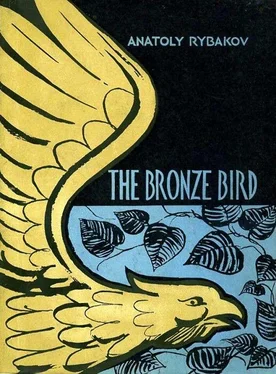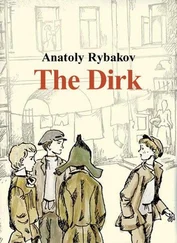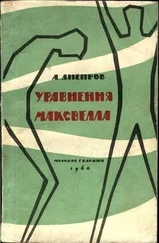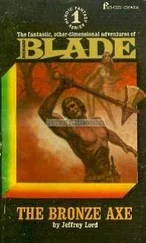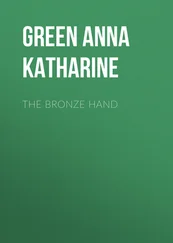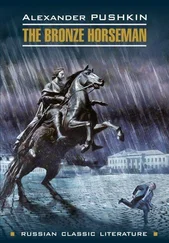Anatoly Rybakov - THE BRONZE BIRD
Здесь есть возможность читать онлайн «Anatoly Rybakov - THE BRONZE BIRD» весь текст электронной книги совершенно бесплатно (целиком полную версию без сокращений). В некоторых случаях можно слушать аудио, скачать через торрент в формате fb2 и присутствует краткое содержание. Город: Moscow, Год выпуска: 1956, Издательство: Foreign Languages Publishing House, Жанр: Детские приключения, Детектив, Исторические приключения, на английском языке. Описание произведения, (предисловие) а так же отзывы посетителей доступны на портале библиотеки ЛибКат.
- Название:THE BRONZE BIRD
- Автор:
- Издательство:Foreign Languages Publishing House
- Жанр:
- Год:1956
- Город:Moscow
- ISBN:нет данных
- Рейтинг книги:5 / 5. Голосов: 1
-
Избранное:Добавить в избранное
- Отзывы:
-
Ваша оценка:
- 100
- 1
- 2
- 3
- 4
- 5
THE BRONZE BIRD: краткое содержание, описание и аннотация
Предлагаем к чтению аннотацию, описание, краткое содержание или предисловие (зависит от того, что написал сам автор книги «THE BRONZE BIRD»). Если вы не нашли необходимую информацию о книге — напишите в комментариях, мы постараемся отыскать её.
THE BRONZE BIRD — читать онлайн бесплатно полную книгу (весь текст) целиком
Ниже представлен текст книги, разбитый по страницам. Система сохранения места последней прочитанной страницы, позволяет с удобством читать онлайн бесплатно книгу «THE BRONZE BIRD», без необходимости каждый раз заново искать на чём Вы остановились. Поставьте закладку, и сможете в любой момент перейти на страницу, на которой закончили чтение.
Интервал:
Закладка:
"What of it if he is ill? He overworked himself and so fell ill. Listen..." Misha took the newspaper from Slava and read aloud: " 'Resolution of workers of the State Administration for the Issue of Bank-Notes... Allow Vladimir Ilyich three months' leave and demand that he implicitly obeys his doctors' orders so that he should recover his health for the weal of the working people.' Is that clear?" Misha said, folding the newspaper. "Lenin will rest and recuperate. So let your kulaks stop rejoicing. You know what?" he suddenly cried as the thought entered his head. "Everybody is writing to Lenin. Why shouldn't we write a letter too?"
Surprise was expressed on every face. What could they write Lenin?
But Misha was carried away by his idea. Forgetting that he had resolved to be as calm and imperturbable as Boris Sergeyevich, the headmaster of the children's home, he sprang to his feet and, waving his arms, said:
"We'll write and tell him to get well quickly."
"That's right," Genka seconded him. "Everybody is writing."
"Even if Lenin doesn't read our letter," Zina said, "he'll be told about it. It'll be pleasant for him to know that everybody is thinking about him, loves him and wishes him health."
Whooping and interrupting each other, the children finally composed a letter to Vladimir Ilyich Lenin:
"Dear Ilyich. We Young Pioneers and Komsomols send you our heartfelt proletarian greetings. We want you to get well quickly. We want to fight for the workers' cause as you have fought all your life. We are always prepared to defend and strengthen Soviet Russia. Get well quickly, our dear Ilyich."
Part II
PURSUIT
Chapter 15
THE BOAT STATION
With one foot against the bank that was slippery with dew, Misha gave the boat a shove, jumped into it and scrambled to the bow.
They were off!
A white mist shrouded the river. The banks were barely visible. The broom shrubs reached out almost to the middle of the river, their thick branches nearly touching the water. Genka and Slava just missed scraping their oars against them. But Longshanks, who was sitting in the stern, skilfully steered the boat along the narrow, meandering river.
Misha took note of the time. Eight kilometres an hour would bring them to the mouth of the river towards evening. It was seventy or eighty kilometres away.
With these thoughts running through his mind, Misha kept a sharp look-out. At this early, predawn hour, it was hard to recognize the landmarks. Everything had become huge, bottomless, mysterious, eerie: the trees, whose crowns could not be seen, looked unexpectedly tall, the shrubbery seemed to be impassable. Misha could not tell if they had passed the little promontory beyond which the boat station stood. Had he missed it in the darkness?
He raised himself. Just then they went round the promontory. At once it grew brighter. Misha saw the tiny boat station. At the same moment, he noticed a woman approaching the hut. He recognized her. It was the "countess." What was she doing there at such an unearthly hour?
"Quiet! Stop rowing!" Misha hurriedly whispered. Genka and Slava feathered oars and the boat slowed down. Misha seized hold of a branch and pulled the boat into the shadow of a nut-tree. From there he had a good view of the boat station.
The mist still hung in the air. The people near the hut looked like vague shadows. The silhouette of a horse harnessed to a heavy cart loomed beyond the hut. And perhaps because the hut was so tiny, the horse and cart seemed to be enormous.
On the bank were the "countess" and the kulak Yerofeyev, a short, misshapen old man in a black cap and iron-rimmed glasses.
The boatman, Dmitry Petrovich, was doing something in the boat, then he straightened up and climbed to the bank. He was about thirty, of medium stature, agile and strong. Not that Misha was afraid of him, but whenever he was with him he felt uncomfortable: even though the man always smiled when he saw Misha there was something insincere and sly about him. He walked about barefoot, in a sateen shirt without a belt. But his face was closely shaved, well-cared for and quite unlike a peasant's, with a narrow, sharp-tipped moustache.
Yerofeyev and the boatman went to the cart. Somebody hopped down from it. The boys peered into the gloom-it was Senka. Yerofeyev took a bast mat down from the cart. Then the three of them dragged two heavy sacks to the boat.
Dmitry Petrovich stepped into the boat and Yerofeyev gave it a shove. The boat rolled, moved away from the bank and, caught by the current, turned towards the middle of the river. Dmitry Petrovich steered it downstream.
Everybody watched the boat: the boys-from their hiding-place, the old woman and Yerofeyev-from the bank, and Senka-from the cart.
The boat disappeared behind a bend. Yerofeyev said a few words to the "countess" and went to the cart. Taking the reins, he turned to the "countess" and again said something. The old woman silently nodded.
The cart started off up the path along the bank leading to the village. The old woman retraced her way across a field to the manor. Her black shawl bobbed up and down amid the tall wheat. Then she was lost to sight.
Chapter 16
ON THE RIVER
Genka was the first to break the silence.
"I wonder what they took away in that boat?" he said under his breath, rising to his feet and looking hard into the distance although both the boat and the boatman were no longer to be seen. "I always thought there was something fishy about the boat station. I said so to Slava only yesterday. Didn't I tell you I had my suspicions, Slava?"
"It wasn't yesterday, but the day before yesterday," Slava corrected him. "So far as I'm concerned, I can see nothing suspicious. There are all sorts of things that people have to transport by boat."
"'Transport,' aha!" Genka teased him. "So early in the morning and in this slinking way. Besides, this kulak and usurer Yerofeyev and his son Senka are mixed up in it." He turned to Misha. "I vote we put Slava ashore."
"What for?"
"If we don't he'll keep putting us off the track with his doubts. He'll whimper all the time."
Misha silenced him with a gesture. But what did it all mean? What brought the "countess," the boatman and Yerofeyev together? They were taking something away at night, secretly...
"The old woman might be sending off things from the manor so that the commune would not get them," he suggested.
"What things?" Longshanks said. "There's nothing in the manor."
"What's in those sacks then?"
"How should I know?"
"All right," Misha decided. "We've got to go downstream anyway. We'll look for Igor and Seva and at the same time keep an eye on the boatman. Only be careful not to let him see us. Push off!"
Longshanks sent the boat downstream with a push against the bank. Genka and Slava bent to their oars. Misha kept the binoculars glued to his eyes but could see no sign of the boatman. He comforted himself with the thought that they would catch up with him in the end.
The little river twisted and turned through a deep and narrow valley. The high bank on their right was washed bare-porous yellow limestone rocks overhung the water and there were fantastically shaped white chalk crags. On the low-lying left bank were narrow flood-meadows and peat-bogs. The slimy bed of the river could be seen through the turbid water only where it was very shallow. The ripples forming on the surface here and there showed there were springs on the bottom.
The boys went past the village and the ferry, but still there was no sign of the boatman. Were they no match for him with their two pairs of oars? Misha signed to his friends to pull towards the bank. He got out of the boat and climbed to the top of a hillock in the hope of catching sight of the boat from there.
Читать дальшеИнтервал:
Закладка:
Похожие книги на «THE BRONZE BIRD»
Представляем Вашему вниманию похожие книги на «THE BRONZE BIRD» списком для выбора. Мы отобрали схожую по названию и смыслу литературу в надежде предоставить читателям больше вариантов отыскать новые, интересные, ещё непрочитанные произведения.
Обсуждение, отзывы о книге «THE BRONZE BIRD» и просто собственные мнения читателей. Оставьте ваши комментарии, напишите, что Вы думаете о произведении, его смысле или главных героях. Укажите что конкретно понравилось, а что нет, и почему Вы так считаете.
